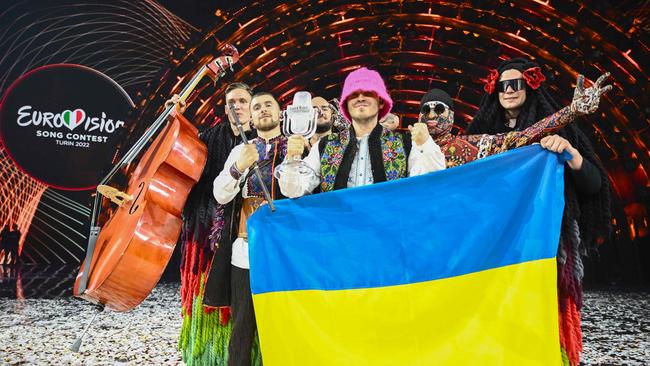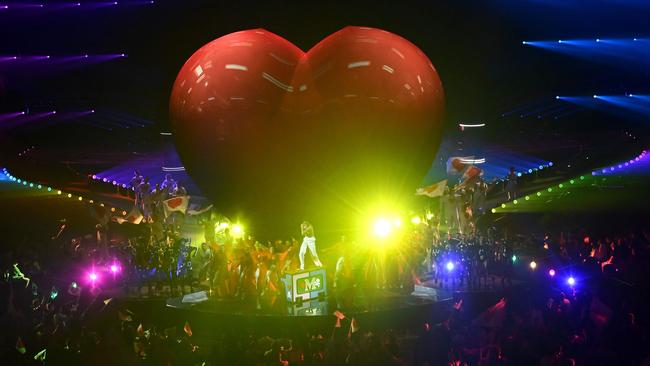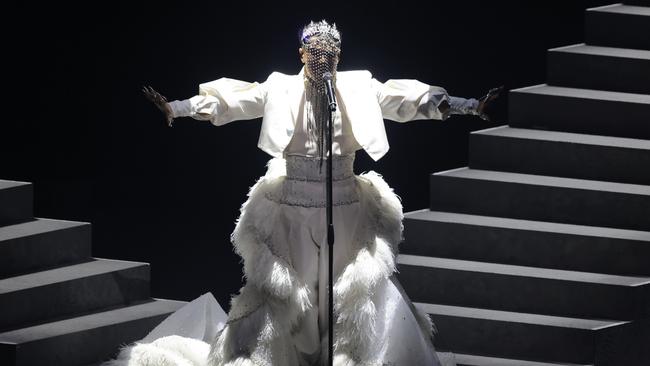Eurovision: here, at last, is some honest trash
With war raging once again on European soil, Eurovision’s origins and founding purpose seem to have risen out of the archives in which they had long been buried.

Here, at last, was honest trash, happily vaunting as a merit the fact that it had no merit to vaunt – and the voting public responded in kind, rising above all questions of talent to crown the entry from Ukraine.
With performance after performance taking kitsch to infinity and beyond, even hardened Eurovision watchers had to melt in admiration.
There was, nonetheless, an element of justice in Ukraine’s triumph, which followed on from its equally political, if perhaps substantively more meritorious, victories in 2004 and 2015.
After all, with war raging once again on European soil, the contest’s origins and its founding purpose seemed to have risen out of the archives in which they had long been buried, and staggered, like a bewildered revenant, across a stage they could scarcely have recognised.
Those origins lay in a Europe that was still in ruins from the devastation of World War II. As the Iron Curtain descended, Europe’s public service broadcasters split into two, with the broadcasters in the West forming the European Broadcasting Union while their Soviet bloc counterparts gathered in the International Broadcasting Organisation.
In theory, both entities were primarily technical, assisting the national broadcasters to get back on their feet; in practice, they were permeated by the rivalries of the Cold War.
In that competition, the EBU was clearly ahead, pioneering the international sharing of content for a still nascent medium, television. Already in 1951, the British journalist George Campey had coined the name “Eurovision” to describe the broadcast by Dutch television of a program transmitted over cable by the BBC; seizing on the term, the EBU launched a series of experiments in the simultaneous broadcasting across Western Europe of television programs.
The EBU’s initial offerings were unfailingly high-minded. The very first was of Queen Elizabeth II’s coronation in 1953; soon after came a message from Pope Pius XII, who called the transmissions “a symbol and a promise”.

One can only presume the pope did not envisage quite what they might be a symbol and a promise of. But that was to be revealed soon enough. With Western Europe’s economies growing at rates which were widely hailed as miraculous, the market for “light music” blossomed, encouraging broadcasters to develop formats that could attract younger viewers.
Two Italian programs acted as pace-setters: the spectacularly successful Sanremo music festival, which was televised; and the radio-oriented Venice International Song Festival, which defined a completely new genre by pitting against each other original, short songs submitted by national broadcasters, with voting by juries in the participating countries determining the winning entry.
Meeting in Monte Carlo in 1955, the EBU’s members decided to merge Sanremo’s glitziness with the basic structure of Venice’s festival in a new competition aimed at markets Europe-wide.
The contest’s first iteration, held in Switzerland in 1956, confirmed its potential; by the early 1960s, the Eurovision Song Contest had secured its position as one of Western Europe’s highest rating events.
That provoked a reaction from the other side of the Iron Curtain, which mounted two attempts at developing a competitor, the first in Czechoslovakia from 1965 to 1968, and the second, which ran from 1977 to 1980, in Poland.
Intended by the communist leadership as an “effective propagandistic counterweight to the Eurovision Festival”, Intervision featured songs “worthy of socialist culture” from such musical heavyweights as Afghanistan, North Korea and Mongolia, alongside utterly predictable East European and Soviet fare.
As things turned out, politics brought both attempts to an early end: having crushed the Prague Spring, the Soviet Union prohibited the Czechs from hosting any events which might turn into protests, while the strikes that followed the banning of Solidarity forced the Polish festival’s cancellation. But even before they met their untimely fate, socialist realism’s procrustean bed had worked its magic, dooming Intervision to irrelevance.
Yet the abject failure of the Soviet bloc’s efforts did not mean everything was well on the other side.

For Marc Bezencon, Eurovision’s founding father, the program’s ultimate purpose was to advance “the essential values of Western Civilisation, which are today in greater danger than ever”, especially “the freedom of the individual”. Europe, Bezencon believed, had a crucial role to play in that respect; but he was deeply suspicious of the emerging European Union, which, in its efforts to be “a super-State in embryo”, confused unity with uniformity.
In marked contrast to that homogenising vision, the contest he designed was to showcase the diversity of the continent’s cultures – and with them, the ability of audiences in each country to enjoy popular music from cultures which were not their own.
It would, however, be difficult to claim that the contest fulfilled those lofty aspirations. Rather, having helped to spawn Europop, successive editions of Eurovision managed to combine conformity with extravagance in a cocktail of the camp, the curious and the crass.
That was, in part, the unintended consequence of the contest’s well-meaning rules. It seemed eminently desirable to prohibit audiences from voting for their own country’s entry; but that encouraged countries to enter songs which relied on excruciatingly simple themes that had broad musical appeal while putting the greatest possible stress on the essentially culture-free elements of appearance, lighting and dance.
Adding to those incentives were the language rules. Initially, they specified that songs had to be in each country’s language, unfairly advantaging French and English, which were broadly understood. Yet their relaxation, and then complete elimination, ensured English’s absolute dominance, reinforcing the homogenising trend.
Finally, as new countries joined the contest, they sought to “turn out the vote” by identifying highly motivated segments of the public that could be targeted through custom-designed acts.
Beginning in 1986 with Norway’s entry Romeo, which featured Jonny Nymoen, a well-known drag dancer, “queer” themes had featured in the competition, attracting an enthusiastic gay and lesbian audience. Picking up on that trend, the newcomers (and especially those from the former Soviet bloc) devised over the top acts, such as Russia’s t.A.T.u. in 2003, that purported to be queer even if they were not, cementing the contest’s queer image and greatly increasing its gay and lesbian fan base—which merely ensured other participants would target that segment too, making its voting weight even more significant.
All that would have sufficed to produce the program’s unique monoculture; but it was raised to extremes by an arm’s race of spending which the newcomers also largely triggered. In 1974, the contest cost less than a million dollars; by the time Covid struck, staging the finals could involve outlays of $50 million or more, while untold sums were being spent researching, composing and promoting individual entries, leaving little room for anything which might not attract mass audiences.
That, in short, is how Eurovision got to be as it is. Kitsch? Undoubtedly. But as that great master, Milan Kundera, prophetically put it, “the brotherhood of man on earth will be possible only on the basis of kitsch”, for only it can obliterate all the subtle differences and fine distinctions by which each culture defines good taste.
Yet that hardly means it’s evil. On the contrary, its enduring charm is that it can mock itself, mocking its adoring audience in the process. In contrast to our aspiring leaders, it holds out no false promises, makes no implausible claims about curing society’s maladies, nor pretends to unlock the gates to a radiant future.
And unlike the Soviet bloc’s Intervision, which was exactly as its masters ordered, Eurovision continues to surprise us, just as it would surprise Mr Bezencon, who expected it to turn out entirely differently. That, surely, is what freedom is all about—which remains the very best reason for loving it every bit as much as we do.




Last Saturday, as the federal election campaign, with its familiar enfilade of deceptive attacks, misdirections and character assassinations, finally drew towards a close, the Eurovision Song Contest provided countless Australians with desperately needed light relief.